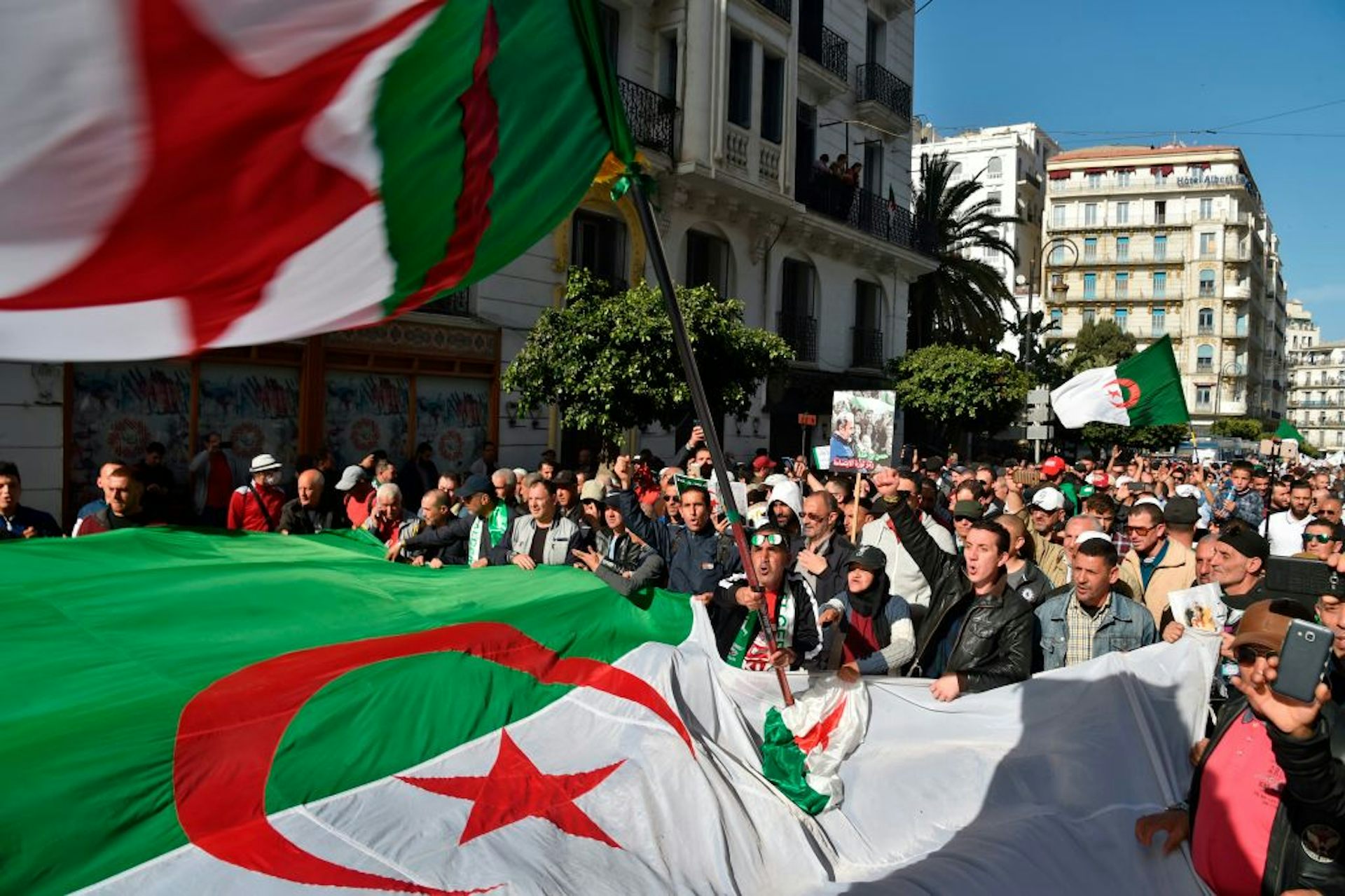
There have been weekly peaceful protests in Algeria for the past year. Early last year protests demanding political transformation, led to the removal by the military of veteran leader, Abdelaziz Bouteflika. Elections were held, and a new president – Abdelmadjid Tebboune – was voted in. But the protests continue. Zoubir Yahia explains why.
What are the grievances that led to the start of the protests last year?
The protests were ignited by a combination of things.
Under Abdelaziz Bouteflika – who served as President of Algeria for 20 years, from 1999 to his forced resignation in 2019 – the country suffered from corruption, nepotism and many of its resources were dilapidated.
Despite this, Bouteflika’s party pushed him to run for a fifth term, even though he was aged 82 at the time and in extremely poor health. His cronies were keen to keep power and preserve the privileges they’d acquired.
But the general public wasn’t blind to what was happening. The president had suffered a stroke in 2013 and the very few times he appeared in public, he looked very frail. When it was announced that he would be running for a fifth term in February 2019, he wasn’t even able to register his candidacy in person.
Algerians felt he was no longer fit to rule, were fed up with the political status quo, were humiliated and felt pity for the ageing leader as it seemed like he was pushed into this fifth term. They poured onto the streets to demand he not serve another term and be removed from office. As a result, on 2 April 2019, the military removed Bouteflika from office.
Why are the protests still happening?
The “Hirak”, as the leaderless movement in Algeria is known, continues because grievances haven’t been addressed. Although there are many different people – of all ages and gender – that take part in the weekly marches, the massive movement is dominated by young people.
In Algeria, 70% of the population is below the age of 30. Many of these young people feel like they don’t have a future in the country because of a lack of work – more than one in four Algerians under the age of 30 are unemployed.
Algeria is a rich country. It has huge natural gas reserves and is the sixth-largest gas exporter in the world. It also globally ranks 16th in proven oil reserves and third in shale gas reserves. But this wealth is controlled by the regime and the oligarchs, who benefit from government contracts. For instance, the state-owned national oil company – Sonatrach – owns roughly 80% of total hydrocarbon production and generates more than 90% of the country’s foreign earnings.
In 2014, Algeria had currency reserves of $179 billion. But oil prices have been falling and the country’s oil and petroleum production has also been in decline due to a lack of investment. The reserves have now shrunk to about $79.8billion. Bouteflika’s government failed to use the wealth generated from these resources to diversify the economy. This would have created jobs for the country’s young people.
In December 2019, Algeria’s Former Prime Minister – Abdelmadjid Tebboune – was elected as the country’s new president. But this was a contentious election denounced by the protesters.
Though Bouteflika had stepped down, the political class that served his regime is still in power. Tebboune is a close ally of Bouteflika’s, having served as a minister and prime minister in his regime. His government is made up mostly of ministers that served under Bouteflika.
The same authoritatian-style system, that relies on the military and intelligence services – and was instituted at independence in 1962 – is also still in place. Algeria does have a parliament, but this is a façade for the regime to claim that the country has a democratic system.
In addition to this, civil liberties – such as the freedom of expression, right of assembly, and freedom of the press – are still curtailed, and opposition leaders are being suppressed.
The protesters have made clear that they no longer accept cosmetic changes, but the regime doesn’t appear to be moving towards genuine democratisation despite the rhetoric.
For instance, Tebboune’s government tabled an intiative to revise the constitution and fight corruption. But it fails to resolve the main issue: the same deputies who approved Bouteflika’s tailor-made constitution – which allowed him to remain in power by removing the two-term limit – are still making decisions in parliament and will thus be called in to approve it.
Algerians now seem determined to continue protesting unless there are more fundamental political changes.
What needs to happen for the situation to improve?
It probably won’t improve until authorities undertake genuine changes. But because there are too many entrenched political and business interests against change, I think that only continued pressure from the hirak and a crumbling economy will work.
There needs to be a total transformation. A new constitution approved by the people should be brought in, corrupt rulers must be removed from office (and stand trial), parliament must be dissolved and true reformers should be brought on board to effect actual change.
These reforms include serious economic reforms that support the country’s young people and a new constitution that makes it difficult for any future presidents to over stay their time in office.
In addition to this, electoral laws must be revised and take into account authentic democratic principles such as free and fair elections, genuinely independent political parties, political participation, and freedom of expression.
Until these core reforms happen, the crisis will endure. Algerians will continue fighting for a new republic.![]()
Yahia H. Zoubir, Visiting fellow at the Brookings Doha Center and Senior Professor of International Studies and Director of Research in Geopolitics, Kedge Business School
This article is republished from The Conversation under a Creative Commons license.

